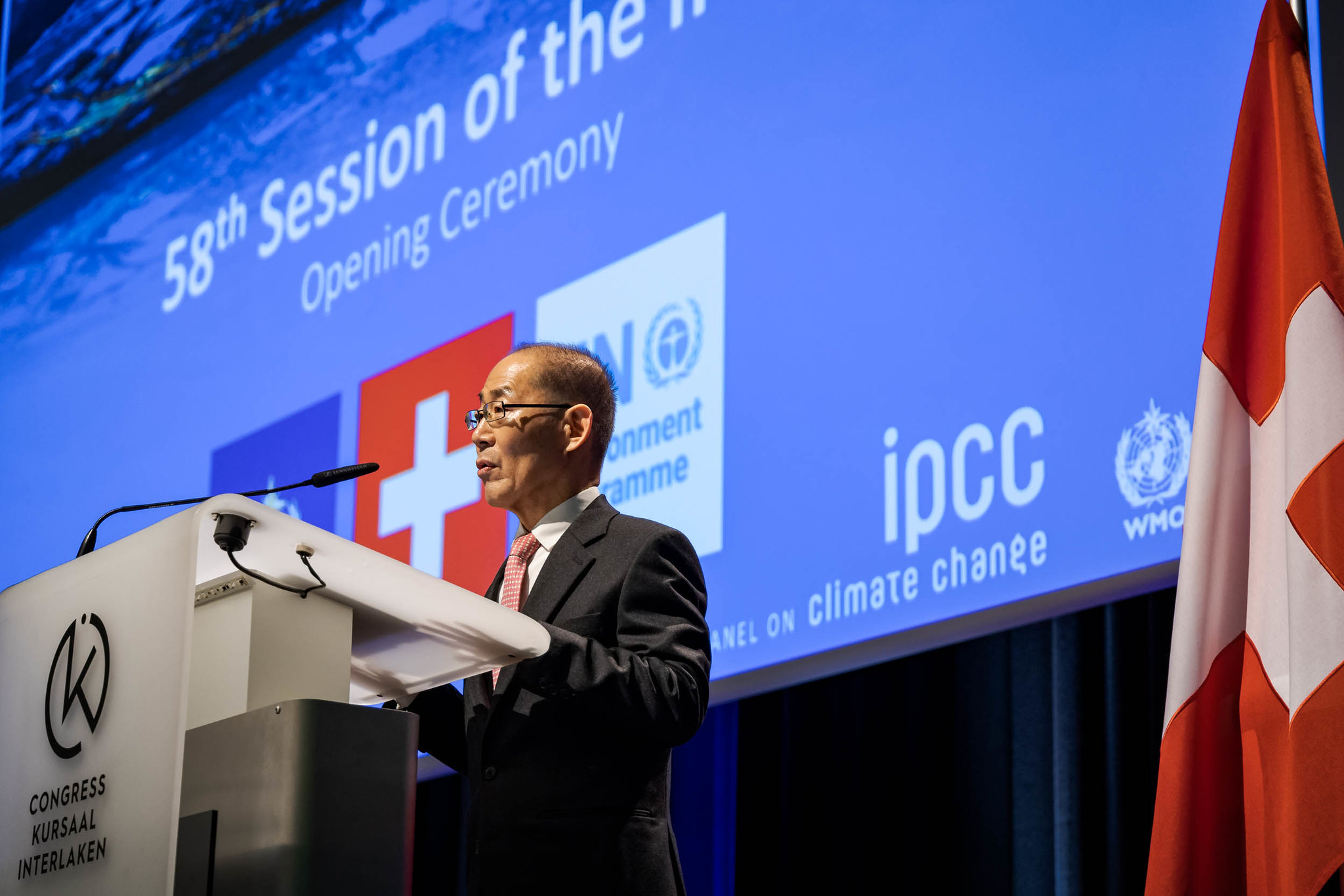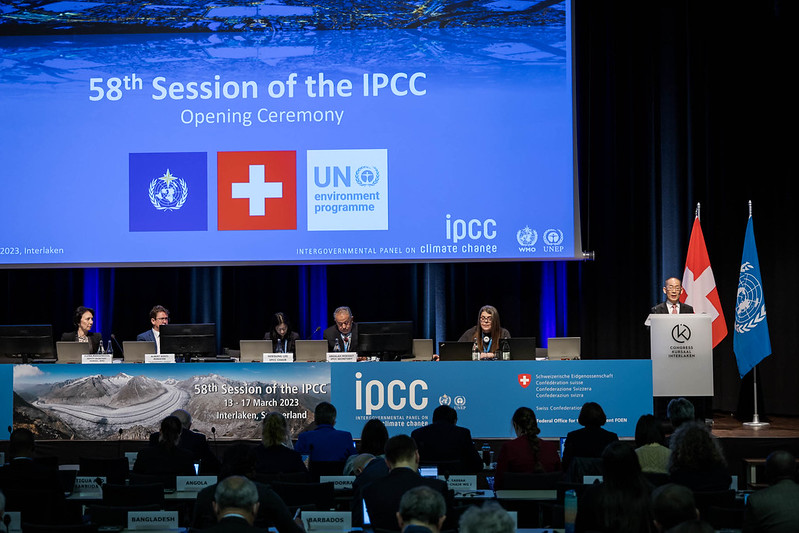The IPCC Should Just Say 1.5 C is Dead
The big takeaway from the IPCC’s latest report is that we’re still falling behind and must do hard things to catch up. It’s time to communicate that differently.

“There is a rapidly closing window of opportunity to secure a livable and sustainable future for all,” according to the IPCC’s AR6 Synthesis Report. That phrase spoke to the parent in me, though maybe not for the sentimental reason you might think.
Most mornings I find myself repeating some version of “there is a rapidly closing window of opportunity to get to school on time.” I walk my 7-year-old to school most mornings—a walk that takes about 20 minutes. The bell rings at 8:35. So as 8:00 am comes and goes, I remind him that, “we still have time to walk, but if we don’t leave in a few minutes, we will have to get in the car and drive” (neither of us want that). Without fail, he’s unmoved by my first warnings about the realities of the clock. Some days I sadly declare that “we no longer have time to walk, but that if we move faster we can drive and make it before the bell.” I’d love to be optimistic about our chances at 8:16 am, but I know it’s simply no longer feasible for us to make it on foot. And this last warning leads to enough momentum to get out the door and we make the bell.
For better or worse, this is the scenario that I most relate to the IPCC’s latest installment of its summary for policymakers. The world—and more specifically national governments, especially the richest nations and corporate interests—should concede that it is not feasible for us to make it on foot, but we still have lots of options to make it.
The IPCC could have declared that limiting average global temperatures to 1.5 degrees Celsius (2.7 degrees Fahrenheit) is no longer feasible, and emphasized that if we move faster, we can keep it as far below 2 degrees C as possible—the fallback target in the Paris Agreement. In fact, it sort of did. “In the near term, global warming is more likely than not to reach 1.5 C even under the very low GHG emission scenario,” the IPCC report says. At another point, the report signals the difficulty of even staying below 2.0°, saying, “a substantial ‘emissions gap’ exists between global [greenhouse gas emissions] in 2030 associated with the implementation of [nationally determined contributions] announced prior to COP26 and those associated with modelled mitigation pathways that limit warming to 1.5°C with no or limited overshoot or limit warming to 2°C assuming immediate action (high confidence).”
And yet, media coverage has in many cases stuck with the “scientists say there’s still a tiny chance” narrative, partly based on the UN Secretary General António Guterres saying, “The 1.5° limit is achievable but it will take a quantum leap in climate action.” Is that the right outlook? Several scientists, including authors of the IPCC report, told the Associated Press that the world is locked into exceeding the 1.5° mark soon. “We are pretty much locked into 1.5,” said report co-author Malte Meinshausen, a climate scientist at the University of Melbourne in Australia. “There’s very little way we will be able to avoid crossing 1.5° sometime in the 2030s” but the big issue is whether the temperature keeps rising from there or stabilizes. “It is certainly prudent to be planning for a future that’s warmer than 1.5 degrees,” IPCC report review editor Steven Rose, an economist at the Electric Power Research Institute in the United States, told the AP. These kinds of comments are not new.

I don’t think this is just semantics. It’s a matter of what is most persuasive to the general public as well as most helpful for framing the next UN climate talks, COP28 UAE. Setting the terms of those talks now would ensure that the parties—and the media—come to COP28 with a shared understanding of the high stakes and how to grapple with so-called “overshoot.”
The communications challenge for the IPCC is how to accurately promote scientific understanding of climate change in a way that resists fatalism but still makes news. You know what makes news? Declaring that the first of two internationally agreed targets is dead. You know what doesn’t make news? Repeating a slightly more dramatic version of what you’ve said over and over and over.
As others have noted (here and here), the IPCC’s “final warning” before 2030 was billed as a major news event but saw mixed reception from news editors. Digital stories of the report were eclipsed by Credit Suisse’s rescue and Donald Trump’s arrest claims on many news sites. Cable networks devoted a whopping 12 minutes to the report while morning and evening broadcast TV spent less than 3 minutes, according to Media Matters. Let that sink in. Big American newspapers certainly covered the story robustly and prominently, but I’d be surprised if it had the Day 2 and Day 3 lasting power that it should. We’ll see by the end of the week how the story of the IPCC Synthesis Report is being handled.
Declaring 1.5 C not feasible would have further elevated the two most important takeaways: 1) that every tiny increment of warming matters and 2) we must make deep, rapid, and sustained emissions reductions. The latter confirms what other reports have told us, which is that the production, processing, and distribution of fossil fuels must be shut off as soon as possible. The former tells us that the warmer Earth gets, the more dramatic and widespread the destruction will be. There’s room for hope and optimism beyond the 1.5° limit: in preventing even worse outcomes of climate change and securing a liveable and sustainable future for all.
As my colleague Ted Parson, environmental law professor and faculty director of the Emmett Institute put it in a recent radio interview: “It pretty much says the world will pass 1.5 C global average heating over pre-industrial levels and the stakes are all in how far we go beyond that. There’s a huge priority on intensive efforts to cut emissions as much as possible. In my reading of this report, it doesn’t say that will suffice to keep the world below 1.5 C, but that doesn’t mean it’s not an imperative. 1.5 C isn’t a cliff beyond which all is lost and we all just curl up into a fetal position and gather with our loved ones and wait to die; 1.5 is a politically demarcated boundary beyond which things get worse and worse incrementally especially for the most vulnerable people and regions of the world.”
On the mornings when my 7-year-old is unmoved by the reality of the clock and we no longer have time to walk, I don’t throw up my hands and say, “No school.” We speed up and do what we must do to beat the clock.
We know what we must do. We know how to do it. We know by when we must do it. But we keep not doing it fast enough. We even know why we keep not doing it. So, let’s face up to all of that and try to speed up—before the bell rings.
Reader Comments
2 Replies to “The IPCC Should Just Say 1.5 C is Dead”
Comments are closed.






Correct me if I’m wrong but I recall that the target is 2 degrees and best efforts are to be made to keep it to 1.5 degrees. The 1.5 aspirational target was politically determined to assure island nations would stay on board so as to achieve unanimity. The “last chance” narrative from the IPCC sets us all up for crying wolf.
Maybe you know “how to do it” but there is far from a global consensus on how to do it. And the UN mechanisms are clearly not capable of “doing it” despite its utility as a meeting place.
Well said, especially “We know what we must do. We know how to do it. We know by when we must do it. But we keep not doing it fast enough. We even know why we keep not doing it.”
How about specifying what “it” is? No, it’s NOT all the many things required to save us. It’s the ONE thing that would empower ALL those things, specifically a global price on carbon. As long as fossil fuels remain artificially “cheap,” their prices divorced from their true costs to society, their continued use is unstoppable. With a robust pricing system, we might be able to throttle demand in time. Without one, I see zero chance. Substitution by renewables will take way too long when we are literally out of time.
I would also suggest that precisely BECAUSE effective carbon pricing would destroy demand, that is the reason we don’t have one. The industry understands that it’s anathema and thus wields its immense political and propaganda powers to fend it off as long possible. You know, shareholder value.
It’s 8:29 and the bell is about to ring. We need a carbon fee, dividend and border carbon adjustment, now. See Econstatement.org.